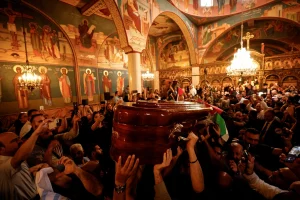In June 2001, Faisal al-Husseini, at the time the Palestinian Authority’s (PA) minister for Jerusalem affairs and a senior PLO official, was laid to rest. The funeral procession began at the Muqata’a in Ramallah, and made its way via the Qalandia checkpoint to the al-Aqsa Mosque for burial.
The coffin was draped with a Palestinian flag, and Palestinian flags waved along the route of his final journey through the streets of occupied East Jerusalem and over his final resting place at al-Aqsa.
Those were the days of the Second Intifada, when the Palestinian flag represented an organisation, the PLO, determined to establish a Palestinian state in the West Bank, the Gaza Strip and East Jerusalem, as quickly as possible.
The Israel of 2001 coped all right with Palestinian flags. So how is it that today – when waving a Palestinian flag is predominantly about identity, the emergence of a Palestinian state any time soon is highly unlikely, and the security threats, however serious, are much less daunting than during the bloody days of the Second Intifada – the Israeli police find it necessary to send a heavily armed force to tear away the Palestinian flag draping the coffin of journalist Shireen Abu Akleh, while violently assaulting the bereaved who accompanied the coffin until the pallbearers very nearly dropped it?
Why was it that in 2001 Israel felt secure when confronting Palestinian flags waving above the streets of its “eternal capital” during the funeral procession of a senior Palestinian political figure, but in 2022 a flag draped in mourning over a journalist’s coffin was deemed a threat to Israel’s existence?
Before attempting to answer that question, it is worth pausing briefly to consider the police riot against Abu Akleh’s pallbearers and the images of violence surely destined to linger long in the media and the memory.
They were scenes that nauseated not only the millions of Palestinians watching the procession live, and the hundreds of millions of Arabs and others around the world who were also looking on, but also more than a few Jewish Israelis, many of them not radical leftists.
An ancient taboo
The taboo against dishonouring the dead and the obligation to ensure a dignified disposition of the deceased’s body are among the most ancient of human customs. Even in wartime, the dead are set apart.
Sophocles, in Antigone, tells of the tragic consequences when the king of Thebes refuses to allow a burial for Antigone’s brother Polyneices, who died after taking up arms against the man who had usurped his throne.
A society that shirks its responsibility to honour the dead, its own or its enemy’s, is relinquishing its own humanity
Judaism, too, makes this process sacrosanct. In the tractate on “blessings” in the Mishnah, it is said that pallbearers “and their alternates, and the alternates’ alternates” are exempt from reciting the Shema, wearing phylacteries, “and all the other commandments in the Torah” that might interfere with their pallbearing duties.
The obligation to allow burial of one’s fallen enemies is part of every international convention on the laws of war. A society that shirks its responsibility to honour the dead, its own or its enemy’s, is renouncing a fundamental tenet shared by all humans and is relinquishing its own humanity.


